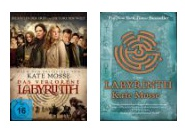
Apparently Labyrinth has finally aired on American television (it certainly took its time considering it was initially released in 2012), so I delved back into my LiveJournal archives to transfer my original review of the book and miniseries onto this blog...
At first glance, Kate Mosse’s Labyrinth looks like the sort of story that’s been specially designed to cater to my specific tastes. An historical mystery? Check. Female protagonists? Check. A smattering of Grail lore? Check. That’s a hat-trick of joy right there. Probably its most unique aspect (one which Mosse also utilizes in Sepulchre and Citadel; the quasi-sequels to Labyrinth) is that there are actually two narratives at work, one contemporary, one historical, each running concurrently over the course of the story until they converge in the final chapters.
Great idea! Plus, the miniseries trailer looked fantastic:
In 2005, Alice Tanner is volunteering at an archaeology dig in the Sabarthes Mountains when she is drawn to a hidden cave in the hills. There in a concealed chamber she finds two skeletons, one of which is clutching a book in a leather bag and a ring with a labyrinth design engraved upon it. Soon the police and forensic experts are called in, disrupting the site and annoying her co-workers.
But one man in particular – Paul Authie – is so deeply interested in the whereabouts of the ring that he grows threatening when it goes missing. As she explores the old cities and ruins of southwest France, Alice is haunted by vivid dreams and a strong sense of déjà vu, and eventually her discoveries lead her to a rich and powerful antiquarian called Marie-Cecile de l'Oradore, a woman who has been searching for the Grail her entire life.
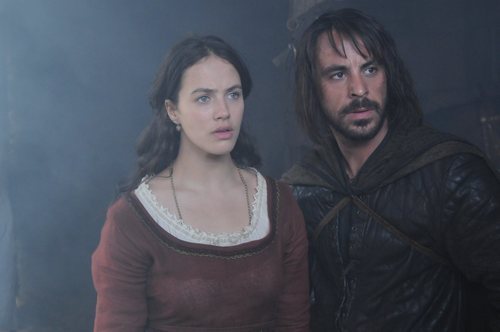
Alaïs and her crappy husband. Seriously, he’s the worst.
In 1209, seventeen year old Alaïs is a newly-wed wife who lives with her husband, father and sister at Chateau Comtal, a citadel under the protection of the very young Viscount Raymond-Roger Trencavel. One morning she goes to fetch herbs on the riverbank and discovers the dead body of a man in the water, his throat cut and his thumb removed. With that discovery, her father reveals to her his long-held secret: that he is one of the guardians of three books that contain the secrets of the Holy Grail.
To complicate matters, an army from the north of France is invading Carcassona in order to eradicate the Cathar heretics. As the Viscount prepares for a siege, Alaïs's father decides to unite the three books and entrust them to his youngest daughter, much to the jealousy and resentment of her elder sister Oriane. With Oriane determined to get her hands on the books, it's up to Alaïs to smuggle the trilogy to safety.
I love, love, LOVE this idea. Two women in different time periods on a hunt to find/protect the Grail? That’s a fantastic premise! But unfortunately, the execution is a bit clumsy. Even more unfortunately, these problems are not fixed in the adaption, but simply transferred from one medium to the other.
Here’s what the main problem is. TV Tropes has something called the Sliding Scale of Plot versus Characters which describes the balancing act that an author must achieve between crafting a plot and developing a character. Though it’s not strictly necessary to favour one over the other (since genres like sci-fi and horror will probably focus on the former, whilst romances and comedies rely on the latter) it’s generally considered a good thing when plot and characters work in accord. Such a balance means that the reader can become invested on both a micro and macro level.
The odd thing about Labyrinth, which I think contributes to its disjointed tone, is that Alice’s half of the story veers strongly on the side of plot over characters, whilst Alaïs’ half favours character over plot.
Alice’s plot is not convoluted exactly – just very cluttered. We’ve got Marie-Cecile, the Evil Matriarch of a powerful family on the hunt for the Grail. She has several people working for her, including lawyer Paul Authie (who is actually a religious fundamentalist out to destroy the Grail) and Shelagh O’Donnell (who is Alice’s friend but also working for Marie-Cecile) who is kidnapped by Authie as part of his schemes.
Then there’s Yves Biau, friends with Shelagh, also working for Marie-Cecile, but secretly in league with Audric Baillard, who is friends with Biau’s grandmother, who was friends with Alice’s great-aunt. There are at least three double-crossers in that list, and because Mosse keeps things as opaque for as long as possible, it’s a muddle trying to keep track of what exactly is going on.
Furthermore, Alice is a complete blank slate. We learn very little about her background (her parents are dead and she’s recently broken up with her boyfriend) and so she largely comes across as a pawn that’s being pushed from place to place with no real sense of conscious proactivity. It’s odd, for though Alice is active in the sense that she travels and gathers relevant information, at the same time it feels as though all the clues fall easily into her lap, requiring her to simply walk the path that the plot creates for her. And ultimately, I just didn’t feel as though I knew her at all.
Not helping is the fact that her half of the story is constantly switching between points-of-view, with segments told from the perspectives of all those aforementioned characters, plus a few more. In comparison, Alaïs’ story sticks mainly with her, and she’s a stronger character for it.
Yet the medieval half of the novel meanders a great deal, and there are long stretches of Alaïs doing relatively pointless things. This leads to pacing issues (Alice’s story races on at a cracking pace, whilst Alaïs’ is almost sluggish in comparison), as well as a couple of odd narrative choices. For some reason, the most interesting part of Alaïs’ story is told to Alice by a third person in the contemporary half of the novel.
But the book does excel in melding its original characters into its real historical context, and in presenting vast amounts of information about the period to the reader without it veering into a lecture or essay (a pitfall of many historical novelists). The descriptions of southern France both past and present are vividly rendered, and Mosse is clearly a passionate scholar of French and Crusader history. I felt as though I knew a lot more about the subject matter than before I started, which is always a good sign.
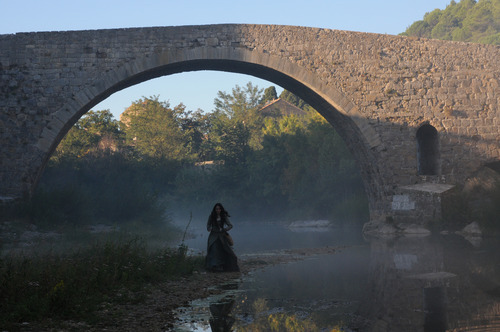
And whatever else its faults, at least the miniseries looks beautiful.
Unfortunately, most of this fascinating historical context (which in many ways is the selling point of the book) is inevitably lost in the transition from page to screen. Though we get a brief overview of the Cathar religion, it’s reduced to the cliff-notes version, in which the conflict becomes nothing more than the pacifist good guys who just want to worship in peace being persecuted by the evil bad guys who are motivated solely by greed or overzealous fundamentalism.
Worse, the Cathar faith lacks any real integration into the framework of the story or in explaining the motivation of the characters. At one point John Hurt’s character says: “the labyrinth is a symbol of the Grail”... and that’s all we get. He doesn’t elaborate on this idea, leaving the entire title of the project and its meaning a mystery to the casual viewer. Certain key physical items (the books, the Grail) lack any proper context for why they’re so coveted, and you can’t help but feel a bit cheated by the wishy-washy resolution, for the entire thing is painfully anticlimactic.
You see, the problem with stories involving the Holy Grail these days is that your protagonist can never actually find it. Or if they do, they can’t keep it (The Da Vinci Code ends with Tom Hanks kneeling in the middle of the street, Indiana Jones had to lose the Grail almost immediately after using it, and heck – even Arthur and his knights in Monty Python never actually set eyes on the damn thing). There’s just too much mystique surrounding the artefact to have any one person gain possession of it. To put it in a museum would immediately diminish its power. And yet a story that doesn’t involve actually finding the coveted MacGuffin will inevitably feel like a let-down. The book and miniseries tries to cover for this with some guff about how the Grail is actually love and memories handed down from generation to generation – but yeah, no one’s buying that.
Then there’s the presence of the Madonna/Whore Complex. According to Kate Mosse, its inclusion was not her intention – but that doesn’t mean it’s not there. Each heroine has a villainous female counterpart, and what each antagonist has in common is that both Oriane and Marie-Cecile's wickedness is implicitly linked to their predatory sexuality.
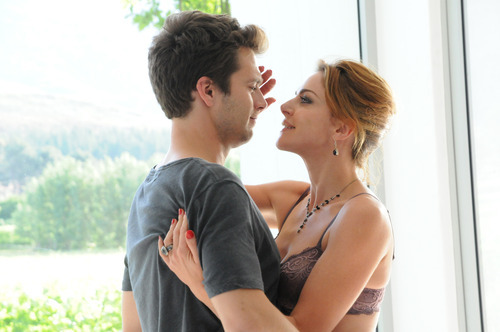
You can tell she’s evil because he’s much younger than she is. Duh.
In the book, Oriane’s establishing scene involves her engaging in an affair with her lover, only to be interrupted by her husband who condemns her for her promiscuity and accuses her of acting like a whore (he doesn’t actually catch her in the act of infidelity, but the mere fact that she’s reclining in her bedchamber without any clothing is something he considers offensive).
Marie-Cecile is a bonafide cougar, who goes through a string of much younger boyfriends, holds her son in contempt, and is after the Grail so that she might remain young and beautiful forever. A lot is made of her sex appeal, and at least two scenes involve her standing naked in front of a mirror to take note of the signs of aging on her body. The miniseries sadly omits the fact that her grandfather passed over his own son in order to bequeath his fortune to her, and there is the inevitable aesop of the villainesses being punished for their ambition, vanity, and tendency to use sex appeal to get what they want.
In saying that, I am obviously not adverse to villainesses in general (to have such a blanket aversion to women as villains would be just plain silly) and despite some of the problems in their depictions, it’s still very refreshing to read a novel of this kind that has four women as its protagonists/antagonists.
And as for the miniseries, I found it more engaging the second time around. Still, I could never quite shake the feeling that I was watching actors rather than characters, wandering around in one unconnected set-piece after another. It’s hard to point my finger on what exactly, but there’s an air of falsity about it; something in the pacing, acting and directing that just didn’t click.
We all know about the importance of suspension of disbelief. It gives us the ability to be emotionally moved by a story even if it contains fantastical creatures and concepts. But it’s a delicate thing, and can work on a very subtle level. I remember listening to the DVD commentary for Shrek a while back, in which one of the directors points out the movement sunflowers as the wind blows through them. She stated that despite the difficulties in animating this detail, no one in the audience ever really notices it. This is because it’s meant to be there – and if it wasn’t, everyone would immediately notice its absence. Sometimes an omission can be just as glaring as the obvious.
And it was this type of violation of suspension of disbelief that marred my viewing of Labyrinth. Strewn through the entire running-length are dozens of tiny lapses in detail that are glaringly obvious and don’t make any kind of sense. And after a while, they begin to accumulate to an extent that’s impossible to ignore. Some examples...
The opening scene involves an archaeological dig being disturbed by a pretty violent earthquake, one that dislodges rocks on the hillside and reveals the location of a hidden cave to Alice. She immediately heads off by herself in order to investigate this new discovery.
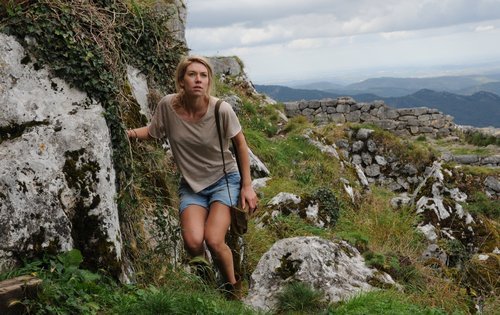
Alice, about to do something amazingly stupid.
Even if you disregard the utter stupidity of exploring a cave seconds after a powerful quake, it’s the reaction from the rest of the site that makes no sense. Namely, that there isn’t one. After the ground stops shaking, there is utter silence from the large crowd of people that we saw milling around mere seconds ago. There are no shouts, no screams, no calls from one person to another to see if everyone’s okay or if anything is broken. It’s completely silent as Alice wanders away in order to look at the cave.
Later Alice undergoes a rather aggressive interrogation by Paul Authie, who begins hinting that she has ulterior motives for being at the dig-site, asking her: “is the truth that you have a particular reason for being here?” Alice replies that she’s just had a bad breakup with her boyfriend, and he snots: “I’m not interested in your personal life.” What? But he JUST ASKED HER what she was doing there!
Then there’s Oriane and Guilhem’s opening scene... There’s no way to put this delicately, so suffice to say that they’re going at it doggie-style with extreme vigour. And yet there’s not a drop of visible sweat on either of them. Not even a shiny sheen.
Elsewhere, Pelletier says of his eldest daughter that she is not to be trusted since: “Oriane thinks too much of her own wealth and comfort,” warning Alaïs to be on her guard around her. Yet later, after Oriane has indeed started making mischief, Pelletier totally disregards Alaïs’s concerns after she tells him: “You do not see the darkness in her heart”. Well, a few scenes ago he did, but now he’s explicitly telling Alaïs that Oriane has no reason not to be trusted.
Other scenes are very awkwardly constructed. There’s one scene in which Oriane arrives at Esclarmonde’s house, hoping to turn it over in search for one of the books that leads to the Grail. Seeing Alaïs already there, she tells her sister that their father wants to speak to her. Alaïs duly leaves, somehow not noticing that Oriane completely disappears from sight between camera-shots, only to realize on speaking with her father that Oriane tricked her into the leaving the house. She rushes back to find soldiers ransacking Esclarmonde’s house, and... orders them to leave. That’s it. Nothing is found, nothing is gained. And why didn’t Oriane simply wait until Alaïs left of her own volition so as not to cast suspicion on herself or be interrupted in her search?
Then there’s Simeon de Montfort, played by John Lynch (a.k.a. Merlin’s dad) who states: “I’ll make honest Christians of these people, even if I have to kill every last one of them to do it.” See any problem with that sentiment?
Oh, and one scene has Oriane having a discussion with her servant while she’s facing away from him, staring out a window. She asks him a question and he silently shakes his head in response. She reacts to this, even though she can’t actually see him.
For some reason Marie-Cecile’s toy-boy is given free run of the house while she sacrifices people out the back.
Authie makes a phone-call whilst still wearing bloody rubber gloves (he couldn’t take them off? Or just wait a few more minutes before using the phone?)
In the search for the three books, men burn down Alaïs’s safe house whilst she’s away picking herbs instead of, say, laying a trap and lying in wait for her to return. By the time she gets back, there’s no sign of anyone at all, leading to the absurd notion that perhaps a freak bolt of lightning simply struck the house and set it on fire. It makes as much sense as anything else.
And finally, one of the last scenes involves a man getting shot in the head. In broad daylight. In an open space beside a location that should have still had a police presence.
I’m sure there’s plenty more, and it’s all these little things that gnaw into the integrity of the world that’s been created. It never lets you forget the fact that you’re watching a television show; never lets you get immersed in the story and characters.
But in saying that, there are plenty of things to enjoy. The soundtrack is incredibly beautiful and evocative: if it’s ever released, I would consider purchasing it. The production values are very high, for everything from the locations to the costumes to the sets are attractive without losing their realistic edge (there’s nothing of the ornate fairytale quality that Merlin possessed or the overt anachronisms of Robin Hood). It also doesn’t veer too far in the opposite direction, in which everything is gritty and filthy and grim. There’s a nice balance between natural beauty and the more uncompromising realities of life in the 13th century.
But there is no real urgency to the story (a side effect from the novel) and it’s not helped by some rather dodgy acting. The actor playing Pelletier in particular is just awful, relating the story of the Holy Grail to his daughter with all the reverence of a man reciting the grocery shopping list. It’s almost funny how offhandedly this guy speaks about secret plots and holy relics and life-or-death situations.
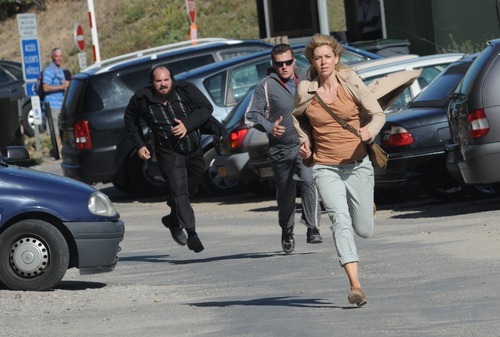
This is about as thrilling as it gets.
Also not helping is the fact that almost every single line of dialogue is pure exposition, blatantly explaining relationships and situations and history directly to the audience. For instance, this line from Guilhem to Pelletier:
“I know why you hate me, my lord. You cannot stand the fact that your daughter loves someone else more than you.”
Disregarding the fact that no human being alive would ever articulate themselves like this, the dialogue is clearly for the benefit of the audience in lieu of trying to show us the dynamic between the two men and why they might not like each other. Throughout the whole thing are people endlessly explaining their interpersonal relationships to each other so that the audience can learn how they’re all connected. It’s difficult to get really involved in these characters since they don’t have any decent dialogue – they just talk exposition. But here’s a rundown of the main cast.
I’ve seen Vanessa Kirby (Alice) in only one other thing: the most recent TV adaption of Great Expectations, in which she played Estella. At the time I commented that she made for a rather bland, dispassionate Estella, though conceded that it may have been a deliberate acting choice to reflect Estella’s coldness and detached manner.
Well, having watched this – nope. That’s just how she is all the time. She wanders through the story with a perpetual expression of blank surprise, and though the script doesn’t do much to help her out, she doesn’t really help herself either.
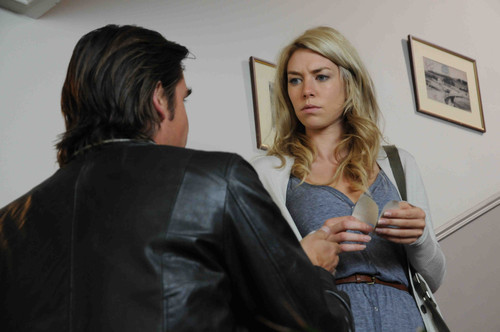
And this is about as expressive as she gets.
Jessica Findlay Brown is probably the most successful in shaping a fully-dimensional character out of her role, simply because Alaïs is given the most screen-time. She’s not constricted by the plot in the way the others are, and her emotional scenes have far more resonance. (Though in saying that, she’s essentially playing Sybil Crawley in a medieval setting).
On the other hand, I found the portrayal of Oriane (Katie McGrath) quite interesting considering she’s had the most changes in the transition from book to screen. Oriane doesn’t have a very strong presence in the novel until about halfway through, whereas the miniseries introduces her much earlier, and gives her new scenes in which she’s eavesdropping, scheming, and generally being a manipulative, ambitious young woman.
But the biggest change is in motivation. In the book her bitterness derives from her marriage to a much older man, whilst in the miniseries she is unmarried and learns halfway through that she’s not actually Pelletier’s daughter. According to one of the servants, her father was a travelling troubadour that her mother slept with while Pelletier was away. (Of course, this makes less sense than Oriane’s impetus in the book, for it never explains why would Pelletier would take her mother back after having a child out of wedlock. And wouldn’t Alaïs be tainted by association if she was the daughter of the very same woman?) Still, in lieu of Oriane’s husband, it gives her a reason to turn against her family.
Also of note is the fact that Oriane’s first scene in the book involves her with an unnamed lover in her bedchamber. It wasn’t until watching the miniseries that I realized there was some ambiguity over the identity of this man in the book: he goes unnamed and isn’t described, though later there are hints that it’s Guilhem considering that Alaïs explicitly notices his absence during this period. I’m not 100% sure what Mosse was going for here, but the miniseries makes it very clear that Guilhem and Oriane are indeed together at this point. (And for the record, the nudity isn’t gratuitous, but it is a bit pointless).
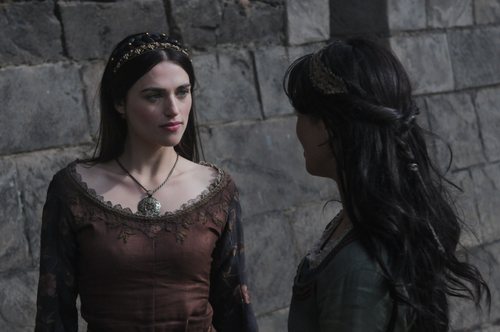
She’s evil, but at least she’s passing the Bechdel Test.
Because of all these changes and clarifications, Oriane comes across as a much stronger character in the miniseries than in the book, perhaps the adaptation’s one clear improvement over the source material. She is introduced earlier and is more central to the plot. She has a network of spies and servants that she utilizes to good effect. She goes in search of information and gathers up blackmailing victims. She’s proactive in seeking an alliance with the Crusaders and offering herself as a wife to Guy D'Evreux.
Her Freudian Excuse may not make a whole lot of sense, but it helps explain her animosity to her father and it’s made explicitly clear that she’s the one who is responsible for his death (not so in the book). In a scene that I would have killed to have seen between Uther/Morgana, Oriane goes to Pelletier on his death bed and confides to him that he’s dying of the poison she slipped into his bread. In short, she makes plans and follows them through – far more successfully and intelligently than Morgana, I must say.
When I first heard that Katie was going to play Oriane, I was a little concerned on her behalf considering the casting reeked of typecasting. Yet I was pleasantly surprised with what she managed to do with Oriane. Katie seems to get a lot of flak for her acting ability, but despite playing another bad girl, and despite some of Katie’s personal mannerisms manifesting in both characters, Oriane is very much removed from Morgana. There were no evil smirks or flouncing, instead Oriane is much more restrained and subtle in her machinations than Morgana, even though each woman had that festering sense of anger and bitterness directed toward the people around her.
As for the rest, there’s not a lot to say. Marie Cecile is characterized as evil mainly through her thick mascara and massive high-heels, and John Hurt as Audric Baillard is clearly slumming it.
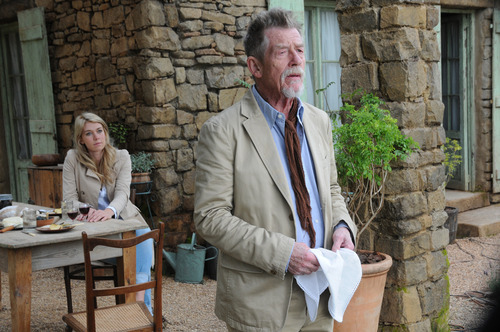
John Hurt looks at his life, looks at his choices, and reminds himself that he used to voice a CGI dragon.
Meanwhile, we’re given no real reason to care about the men in Alaïs’s life – either her disinterested father or her awful husband. In fact, the narrative surrounding Guilhem baffles me.
We’re apparently supposed to feel bad for him when Oriane begins to threaten him with exposing their affair, even though he’s a grown man messing around with his sister-in-law of his own free will. We’re not even given a decent reason as to WHY he’s sleeping with her. He didn’t seem to like her that much, and they have what looks like the most passionless sex ever. It ultimately feels like a rather nasty case of Sex is Evil And I Am Horny, in which a man lusts after a woman and becomes furious and disgusted with her because of it, even though he’s fully capable of making his own decisions. So yeah, I didn’t really warm up to this guy.
Oh, and Tom Felton is in this. Yeah. Um...he’s fine, I guess? It seems like quite a calculated decision on his part to play a young, honourable nobleman (all the Harry Potter kids have discussed the dangers of typecasting) but it’s not a particularly memorable role.
So, do I recommend Labyrinth? Despite all that I’ve gone over in this review, I still enjoyed it. I’ve read the book twice, and I admire Kate Mosse's writing style, even as I get frustrated by her inability to really breathe life and urgency into her fantastic ideas. And I wouldn’t have spent this much time and energy unpacking it if I thought the whole thing was a complete waste of time.
There’s that saying that you can enjoy things while still acknowledging that they’re problematic – and you can also enjoy mediocre things whilst knowing that they’re really not very good. Yet most of the actors seem invested in what they’re doing, it all looks and sounds great, and it resulted in some amazingly beautiful promotional shots. That the story is driven by four female characters is still rare enough to deserve some credit and attention, and there are a couple of other noteworthy women: the presence of Esclarmonde, an elderly woman who serves as Alaïs’s mentor, and Rixende, a serving girl who makes a great sacrifice on Alaïs’s behalf.
Basically, I’ll remember Labyrinth as a story whose premise was superior to its execution; a premise which might one day get the story it deserves.
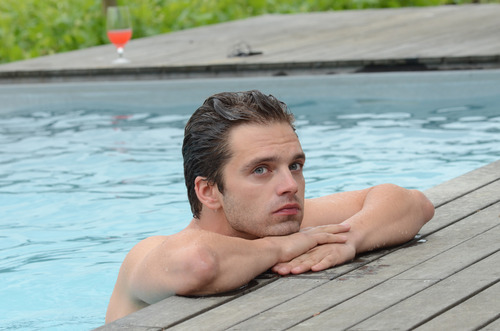
Oh, and shirtless Sebastian Stan is in this. At least they know their audience.
Great review! It was a pleasure to read that! Do you know other books/movies/series about a woman similar to Marie-Cecile?
ReplyDelete